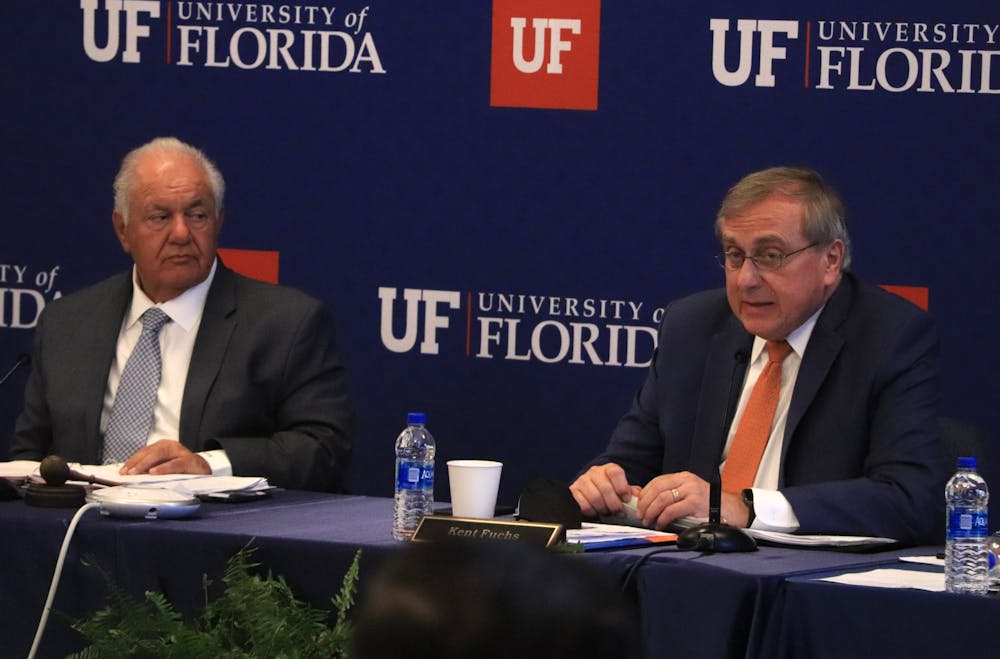Following a monthlong scandal accusing UF’s Board of Trustees and other administrators of appeasing Gov. Ron DeSantis, board members defended themselves at a Board of Trustees meeting Dec. 3.
The board’s chairman Morteza “Mori” Hosseini defended himself and other administrators by blaming faculty for the policy that led to the barring of professor testimonies that started the scandal, expressing disappointment in faculty union leadership and calling media reports incomplete.
Hosseini denied that he or other board members influenced the school’s decision to bar the professors from serving as expert witnesses in cases against laws DeSantis champions. He was accused of interfering after reports showed he and other members have direct political ties with DeSantis. In addition to his construction company donating $112,000 to DeSantis’ campaign, the governor’s wife also used Hosseini’s private jet to fly to a fundraiser in 2019.
“My conversations with the governor have been about one thing and one thing only – asking him to help UF to become one of the leading universities in the country,” Hosseini said.
“The governor has done exactly that in response.”
A report from the Tallahassee Democrat also showed Hosseini emailed Dr. Joseph Ladapo’s resume directly to UF Health’s president shortly before Ladapo was offered professorship at UF’s College of Medicine. The same week as his appointment to UF faculty, Ladapo was appointed as Florida’s next surgeon general and secretary of the Department of Health by DeSantis.
Ladapo has faced criticism for questioning the safety of vaccines as well as disapproving of mask mandates and lockdowns, a view that mirrors DeSantis’ stances. Notably, UF’s social distancing and masking policies have also echoed the governor’s. The university went against Alachua County’s policies and didn’t enforce a mask mandate despite pressure from the city government.
In addition to Hosseini’s ties to DeSantis, one of the deans who rejected a professor from testifying against the state said senior UF administration officials directed him to do so.
Other board members also contributed to DeSantis’ campaign: Jim Heavener donated $250,000 while Rahul Patel gave $175,000 and Anita Zucker $100,000, according to a Herald/Times Tallahassee Bureau report.
In the Dec. 3 meeting, Zucker pointed to president Kent Fuchs’ decision to allow white supremacist Richard Spencer to speak on campus in 2017 as an example of UF supporting freedom of speech.
Meanwhile, Patel dismissed faculty who vocally oppose the administration as a loud minority of total faculty.
However, UF’s faculty senate voted 70 to 31 to rebuke the administration’s COVID-19 policies through a vote of ‘no-confidence’ exactly two weeks before the meeting. The vote remained unmentioned even after board member and senate faculty chair David Bloom defended his role in both bodies as being appropriate following Patel’s comments.
The board did mention a faculty union vote to review UF’s conflicts-of-interest and outside activities policies.
But Hosseini blamed the initial barring of the professors on the review, which was prompted by some professors focusing too much of their time on outside work.
He said a 2019 letter from the National Institute of Health to UF prompted an investigation that found a number of professors were neglecting their work at UF for outside paid work. They also kept their outside work a secret from UF, Hosseini said.
That revelation led the school to revise its outside activities policies in 2020. The revisions were voted on by the faculty senate in July, he said.
Hosseini went on to condemn faculty who take on second jobs at the university’s expense, faculty who improperly advocate personal political views at the expense of other political views and a specific professor who tried to find a way for his faculty to avoid coming into the classroom during the COVID-19 pandemic.
“This behavior is unacceptable. It is disrespectful not only to the taxpayers of Florida, whose hard-earned dollars pay faculty salaries, but it is also disrespectful to these faculty members’ hard-working colleagues,” he said. “It is disrespectful to the students who depend on their professors’ full attention and commitment. This will not stand. It must stop, and it will stop.”
Hosseini also expressed disappointment in union leadership at UF for encouraging donors to stop contributing to UF as a form of protest.
United Faculty of Florida president Paul Ortiz said it was UF alumni who initiated the boycott — his organization just added its voice to the movement.
Ortiz also said he disagrees with any implication that faculty who are outspoken against UF’s policies are a minority opinion among faculty.
“If it was just faculty who's upset about this, it would be one thing,” he said. “But in reality, it's the whole community that's appalled. It’s colleagues all across the country. If it was just a minority of faculty, it wouldn't have received the kind of sustained attention that it is receiving.”
Ortiz said UFF is encouraging another external investigation into the scandal. That would add to three other investigations: One proposed by the senate faculty, a U.S. congressional subcommittee investigation and an investigation by UF’s accreditor. None of the investigations were mentioned in the meeting.
The university is also facing a lawsuit from a group of professors who were barred from testifying. Those same professors filed a court motion to end the university’s conflicts-of-interest policy the same day of the meeting.
Contact Alexander Lugo at alugo@alligator.org. Follow him on Twitter @AlexLugo67.

Alex is a fourth-year journalism student at UF and is in his third semester at The Alligator where he is serving as the university editor. He previously reported on university administration and the city and county commission. In his free time, he enjoys video games, traveling and being outdoors.






